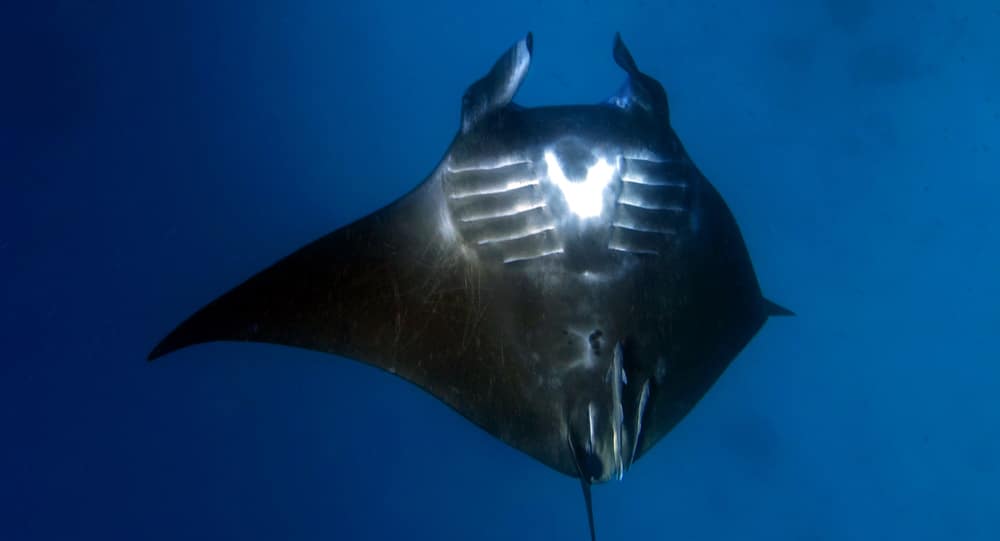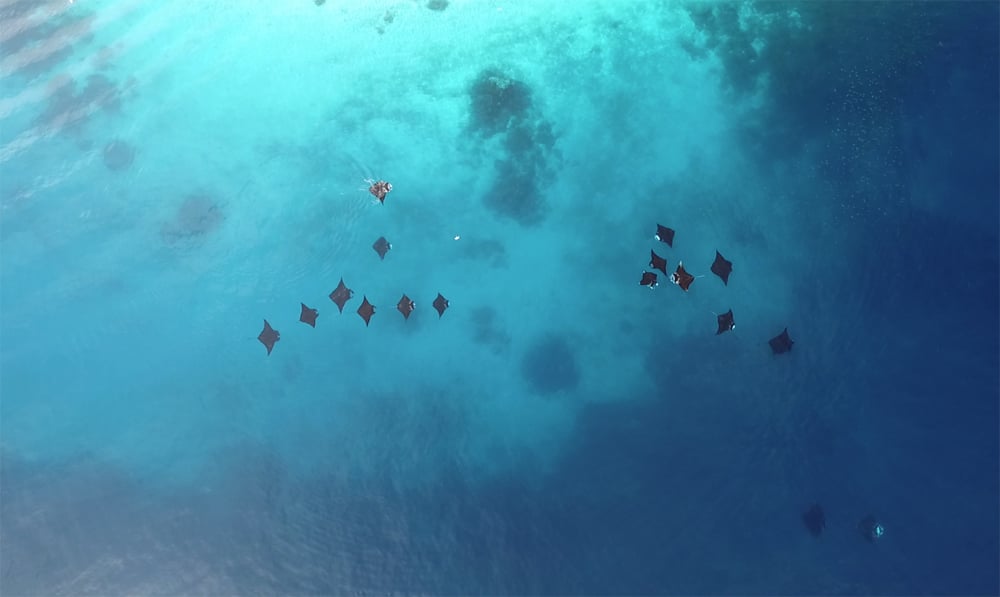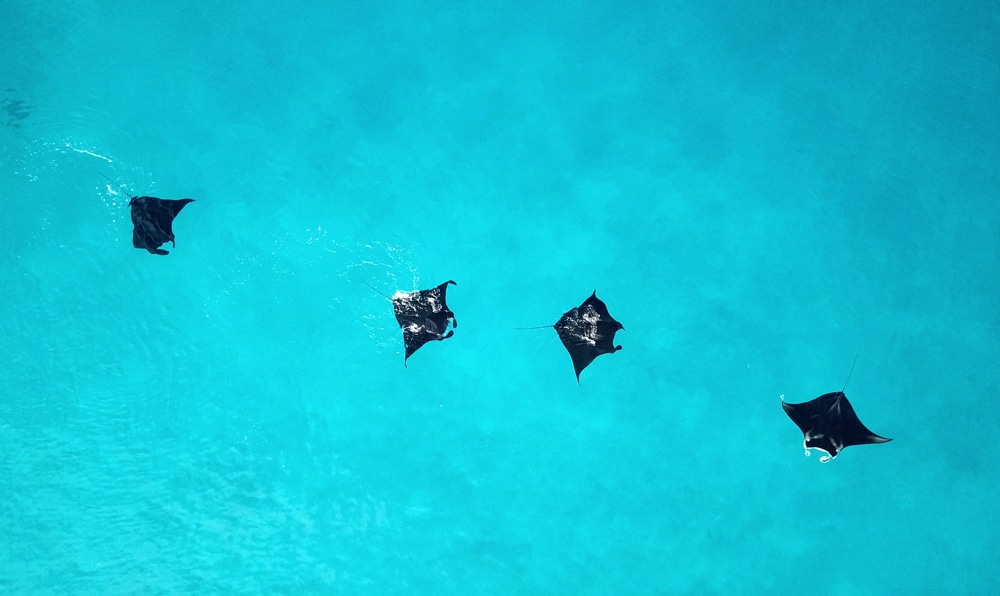Marine Life & Conservation
MMF study shows manta rays form social bonds

 Manta rays form social relationships and actively choose their social partners, a new study has revealed. Research published today by scientists from the Marine Megafauna Foundation, Macquarie University, the University of Papua, and the University of York is the first to describe the structure of social relationships in manta rays.
Manta rays form social relationships and actively choose their social partners, a new study has revealed. Research published today by scientists from the Marine Megafauna Foundation, Macquarie University, the University of Papua, and the University of York is the first to describe the structure of social relationships in manta rays.
Sharks and rays are often thought to be solitary creatures, but reef manta rays typically form groups at shallow-water feeding and cleaning sites. The researchers studied the structure of more than 500 of these groups over five years, in Indonesia’s Raja Ampat Marine Park, one of the most biodiverse marine habitats on Earth. They found two distinct but connected communities of rays living together. These social communities were quite differently structured, one being made up of mostly mature female rays, and the other a mix of males, females and juveniles.
“We still understand very little of how mantas live their lives, but we know they are socially interactive, and these interactions seem important to the structure of their populations. Understanding social relationships can help predict manta ray movements, mating patterns and responses to human impacts. That’s essential for conservation and ecotourism efforts,” said lead author Rob Perryman, a researcher for Marine Megafauna Foundation and PhD student at Macquarie University.
The study, published in the journal Behavioral Ecology and Sociobiology used social network analysis to show that manta ray communities contain a web of many weak acquaintances, with some stronger, longer-lasting relationships. Though they do not live in tight-knit social groups, the team noticed that female mantas tend to make long-term bonds with other females, while males did not have many strong connections. This could be due to different reproductive strategies or dispersal patterns.
“Like dolphins, manta rays are intelligent and perform collective behaviors such as foraging and playing. They are curious, often approaching humans, and individuals appear to have different personalities. It turns out that reef manta rays actively choose to group with preferred social partners,” Perryman added.
To identify social structures, the researchers took identification photos of all rays present in each group, and monitored whether individuals were more likely to be seen together (at different times and in different locations) than expected if encounters were random.
The locations used by the rays seemed to be important to their social relations. Manta rays form groups at cleaning stations where they are attended to by cleaner wrasse and other small fish. The team observed that certain social groups were regularly seen together at these sites, and so may be using them as social meeting points. Some rays had very strong affinity to certain cleaning stations. The researchers were surprised to find this given the close proximity of all sites and that mantas are generally mobile and wide-ranging animals. They concluded that the rays left and returned to preferred sites where they formed groups through a ‘fission-fusion’ social process.
Like many sharks and rays, manta rays are internationally threatened animals and population declines have been reported in various locations worldwide. They are hunted for their valuable gill plates used in traditional Chinese medicine. Other anthropogenic threats include injuries or entanglement in discarded nets and lines, pollution and habitat destruction.
It is important to find the right balance between preserving a species and encouraging sustainable wildlife viewing that brings economic benefits. “Knowing how mantas interact is important, particularly in areas where they are susceptible to increasing dive tourism,” said Dr Andrea Marshall, co-founder and principal scientist at the Marine Megafauna Foundation. “The increasing number of boats and scuba divers around reef mantas in Raja Ampat, particularly at cleaning stations, could break apart their social structures and have impacts on their reproduction.”
Dr. Ricardo F. Tapilatu, a co-author working at the University of Papua and the main Indonesian counterpart for the project said: “Pristine marine environments such as the manta ray aggregation sites in Raja Ampat are of increasing interest to tourists. This collaborative research is set in the extremely biodiverse region of the Coral Triangle, located in the Indo-Pacific, where we set up science-based conservation management for such unique natural systems.”
In Indonesia, manta rays are protected since 2014 but artisanal fishing remains an issue, and there is still little awareness of the threats they face. The team hopes that showing the social nature of manta rays will help broaden support and public enthusiasm for their protection around the world.
“Collecting more information about their social relationships and structures will be needed to develop sustainable ecotourism and conservation initiatives that allow mantas to coexist with humans in their natural habitats,” concluded Perryman.
This research was supported by Papua Explorers Dive Resort, Raja Ampat SEA Centre, University of Papua and Barefoot Conservation, and carried out under a RisTek-Dikti permit.
The study by Rob Perryman et al, titled ‘Social preferences and network structure in a population of reef manta rays’ is published in the journal Behavioral Ecology and Sociobiology on 22 August 2019 and will be available here.
To find out more about the Marine Megafauna Foundation visit their website by clicking here.
Marine Life & Conservation
Double Bubble for Basking Sharks

 The Shark Trust is excited to announce that, for two more days only, all donations, large or small, will be doubled in the Big Give Green Match Fund!
The Shark Trust is excited to announce that, for two more days only, all donations, large or small, will be doubled in the Big Give Green Match Fund!
Donate to Basking in Nature: Sighting Giants
The Shark Trust is hoping to raise £10k which will be doubled to £20k. This will go towards Basking in Nature: Sighting Giants. And they need YOUR help to reach they’re goal.
The Shark Trust’s citizen science project is to monitor and assess basking sharks through sightings; encouraging data collection, community engagement, and promoting nature accessibility. This initiative aims to enhance health and wellbeing by fostering a deeper connection with British Sharks.
Campaign Aims
- Increase citizen science reporting of Basking Sharks and other shark sightings to help inform shark and ray conservation.
- Provide educational talks about the diverse range of sharks and rays in British waters and accessible identification guides!
- Create engaging and fun information panels on how to ID the amazing sharks and rays we have on our doorstep! These can be used on coastal paths around the Southwest. With activities and information on how you can make a difference for sharks and rays!
- Promote mental wellbeing through increasing time in nature and discovering the wonders beneath the waves!
Donate, and double your impact. Click Here
Marine Life & Conservation
Leading UK-based shark conservation charity, the Shark Trust, is delighted to announce tour operator Diverse Travel as a Corporate Patron

 Corporate Patrons provide a valuable boost to the work of The Shark Trust. The Trust team works globally to safeguard the future of sharks, and their close cousins, the skates and rays, engaging with a global network of scientists, policymakers, conservation professionals, businesses and supporters to further shark conservation.
Corporate Patrons provide a valuable boost to the work of The Shark Trust. The Trust team works globally to safeguard the future of sharks, and their close cousins, the skates and rays, engaging with a global network of scientists, policymakers, conservation professionals, businesses and supporters to further shark conservation.
Specialist tour operator Diverse Travel has operated since 2014 and is committed to offering its guests high quality, sustainable scuba diving holidays worldwide. Working together with the Shark Trust will enable both organisations to widen engagement and encourage divers and snorkellers to actively get involved in shark conservation.
“Sharks are truly at the heart of every diver and at Diverse Travel, we absolutely share that passion. There is nothing like seeing a shark in the wild – it’s a moment that stays with you forever!” says Holly Bredin, Sales & Marketing Manager, Diverse Travel.
“We’re delighted to celebrate our 10th year of business by becoming a Corporate Patron of the Shark Trust. This is an exciting partnership for Diverse and our guests. We will be donating on behalf of every person who books a holiday with us to contribute towards their vital shark conservation initiatives around the world. We will also be working together with the Trust to inspire divers, snorkellers and other travellers to take an active role – at home and abroad – in citizen science projects and other activities.”
Paul Cox, CEO of The Shark Trust, said:
“It’s an exciting partnership and we’re thrilled to be working with Diverse Travel to enable more divers and travellers to get involved with sharks and shark conservation. Sharks face considerable conservation challenges but, through collaboration and collective action, we can secure a brighter future for sharks and their ocean home. This new partnership takes us one more valuable step towards that goal.”
For more information about the Shark Trust visit their website here.
For more about Diverse Travel click here.
-

 News3 months ago
News3 months agoHone your underwater photography skills with Alphamarine Photography at Red Sea Diving Safari in March
-

 News3 months ago
News3 months agoCapturing Critters in Lembeh Underwater Photography Workshop 2024: Event Roundup
-

 Marine Life & Conservation Blogs3 months ago
Marine Life & Conservation Blogs3 months agoCreature Feature: Swell Sharks
-

 Blogs2 months ago
Blogs2 months agoMurex Resorts: Passport to Paradise!
-

 Blogs2 months ago
Blogs2 months agoDiver Discovering Whale Skeletons Beneath Ice Judged World’s Best Underwater Photograph
-

 Gear Reviews2 weeks ago
Gear Reviews2 weeks agoGEAR REVIEW – Revolutionising Diving Comfort: The Sharkskin T2 Chillproof Suit
-

 Marine Life & Conservation2 months ago
Marine Life & Conservation2 months agoSave the Manatee Club launches brand new webcams at Silver Springs State Park, Florida
-

 Gear Reviews3 months ago
Gear Reviews3 months agoGear Review: Oceanic+ Dive Housing for iPhone








